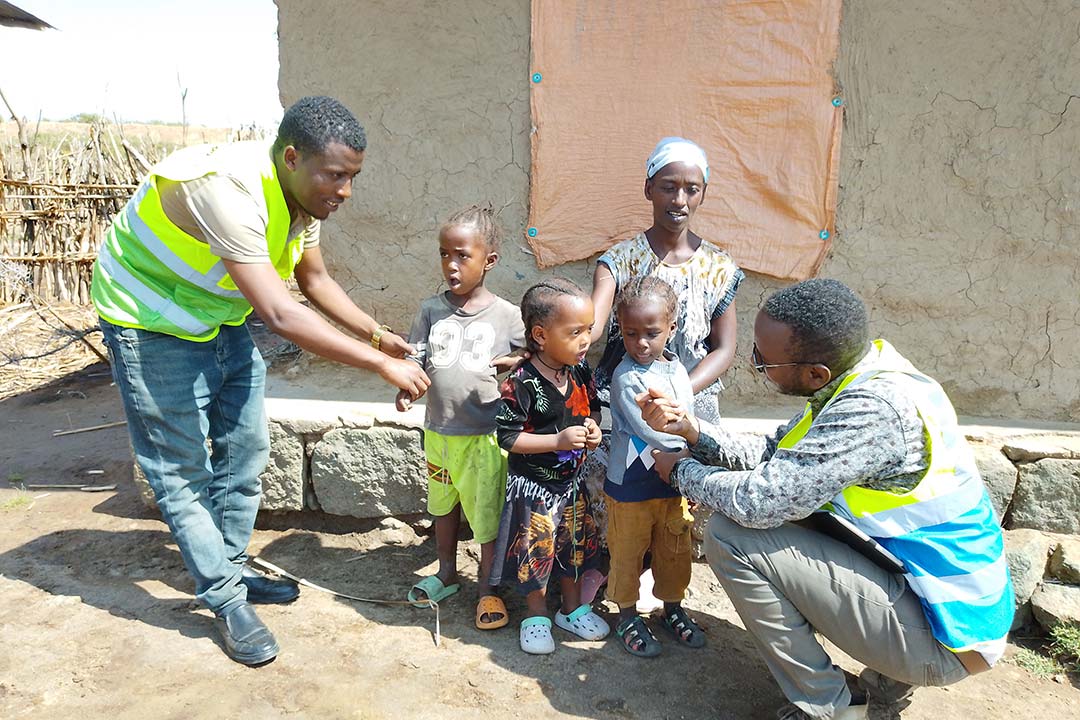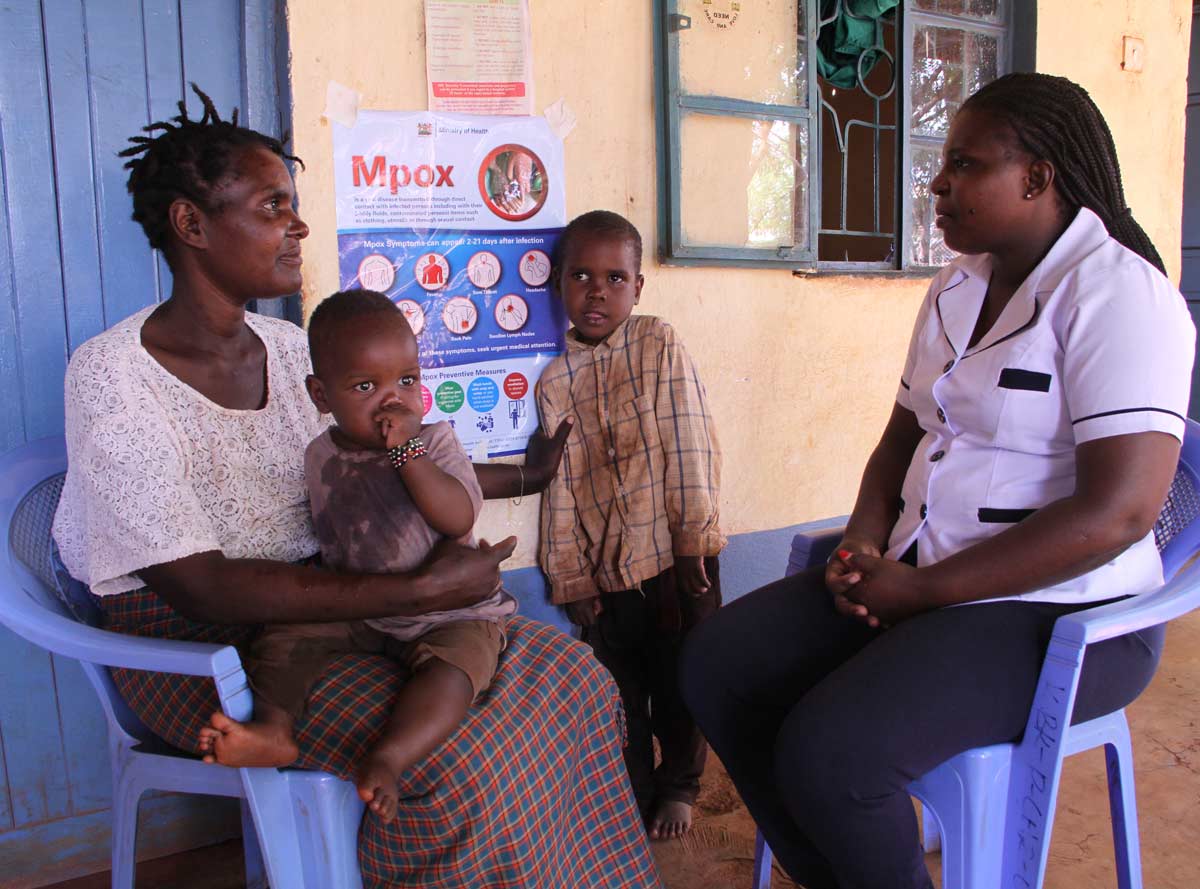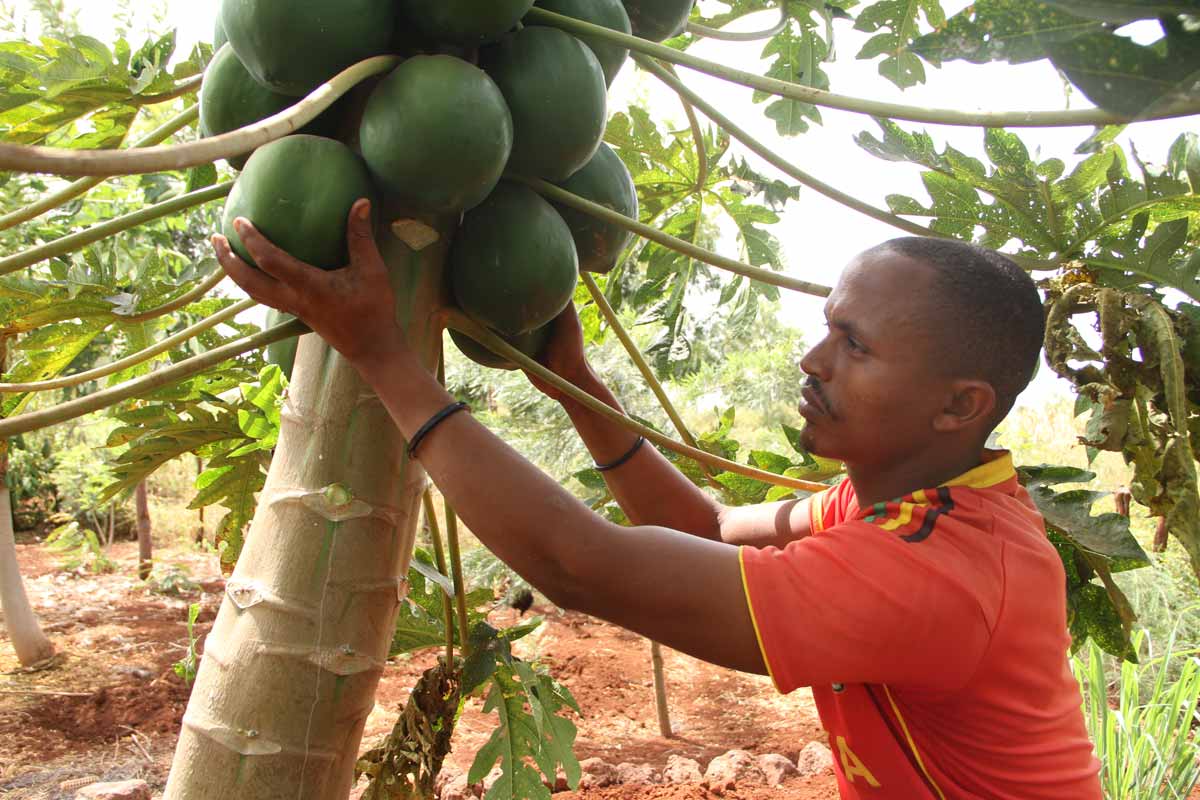What’s a community health worker? In this Ugandan village, she’s a one-woman support network
Dorothy Kirunda is what she has to be: a health provider, counsellor, social justice campaigner, witness, teacher, engine of charity and adoptive mother.
- 10 October 2025
- 6 min read
- by James Karuga
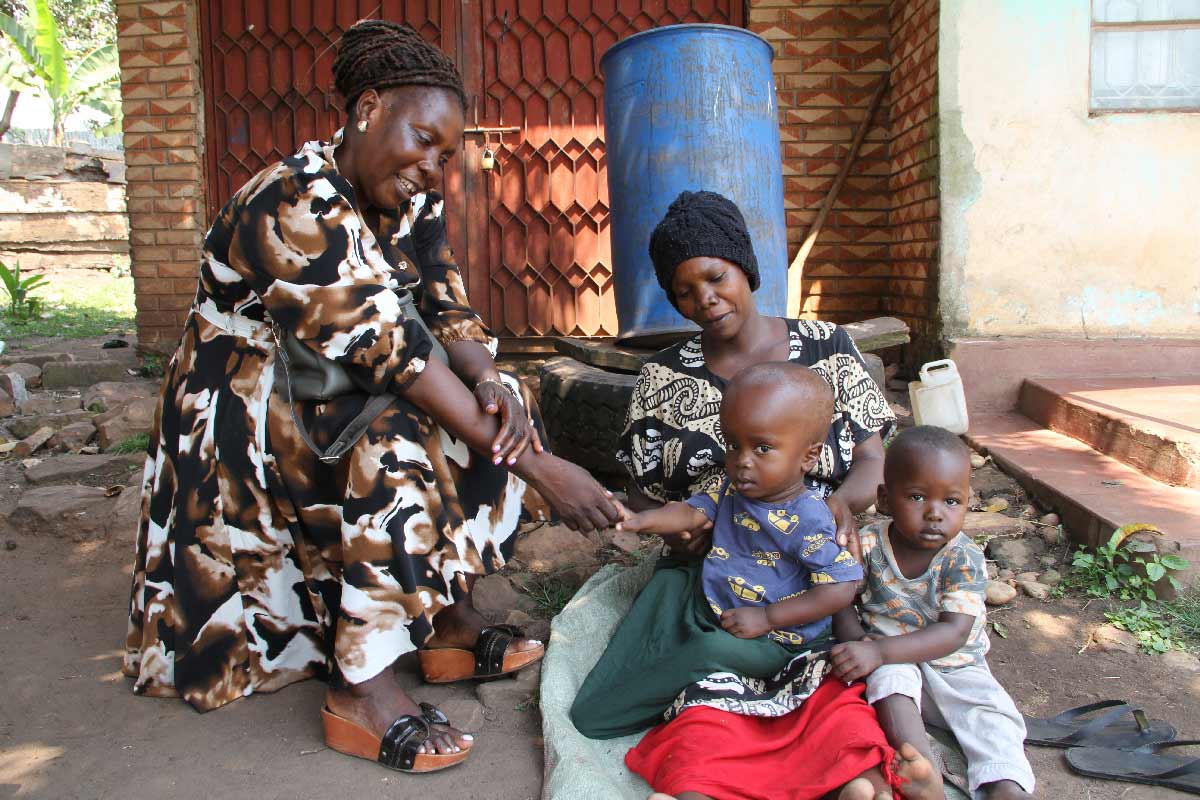
In Kiyindi, a bustling, densely-populated rural fishing town on Lake Victoria’s shores in Uganda, Dorothy Kirunda, a local community health worker (CHW) sits, listening to Aisha Nakabuye, who is holding a pair of twins in her lap.
The twins are a boy and girl, but the boy has hydrocephalus, and Kirunda is there to find out how the boy is faring. “Before my son could not sit up – he would fall over. But because of the training you gave us he can sit well,” Nakabuye smiles. Kirunda strokes the boy’s hand while chatting with his mother about his healthy weight gain and overall radiance.
Part health worker, part social worker, it’s often hard to put a label – or a limit – on what Kirunda’s support means to local mothers. To Nakabuye, for one, Kirunda has been a port in a storm. After she delivered the twins and discovered the boy had hydrocephalus, her relatives stigmatised her, and distanced themselves. She was told, if the girl had not resembled her biological father, she would have been expelled from the family, to take the affected boy to the man who “fathered” him.
During that time, it was Kirunda who calmed her, and showed her how to care for and feed the boy. It’s not the first time Kirunda has seen social stigma do more harm than material disadvantage. Some parents hide children with disabilities, Kirunda says, and never let the public see them, in order to dodge the stigma heaped upon them by “ignorant” community members. In this poor, relatively isolated community, superstition is rampant, so children with developmental disabilities are sometimes characterised as “bewitched”.
Meeting special needs
To counter such perceptions, Kirunda and her fellow CHWs have reached out to 60 homes in Kiyindi with children with physical or developmental disabilities or neurological difficulties, to reassure them that they are not alone.
“We counselled and empowered them to nurture those children, and they are happy, and have hope. They have accepted the children, and are loving them,” Kirunda told VaccinesWork.
Kirunda worries that some of the children’s disabilities might have been avoided, if the mothers had delivered at Makonge Health Centre III, in the care of skilled birth attendants, instead of at home. She has met pregnant mothers with malaria, who failed to be treated. During some home births, complications occur that deprive the baby of oxygen. By the time health workers like Kirunda visit the newborn, it’s often too late to undo that damage.
That’s why Kirunda reminds pregnant mothers like Nakabuye to go for antenatal care visits and follow the babies’ immunisation schedule after delivery. She uses a smartphone health application to track the immunisation schedule of nursing mothers.
Tackling rampant STIs
She also mobilises community members for events at the health centre that offer training on sexually transmitted infections (STIs). Kiyindi is a transient town, and some in the fishing community engage in risky sexual behaviour. STIs like syphilis, gonorrhoea, genital warts and HIV circulate at high rates here.
Buikwe District – which contains Kiyindi – has, at 9%, higher HIV rates than Uganda’s national average, which is 5.4%, according to data published by Arise Uganda HIV Network, and Uganda AIDS Commission respectively. Kiyindi’s fishing communities are thought to contribute disproportionately to that elevated figure.
According to Kirunda, when men go fishing for days at Lake Victoria, some families are left with nothing for sustenance. “When families are helpless, children don’t go to school, that’s why those left behind [wives] get into sexual work with other men,” Kirunda told VaccinesWork.
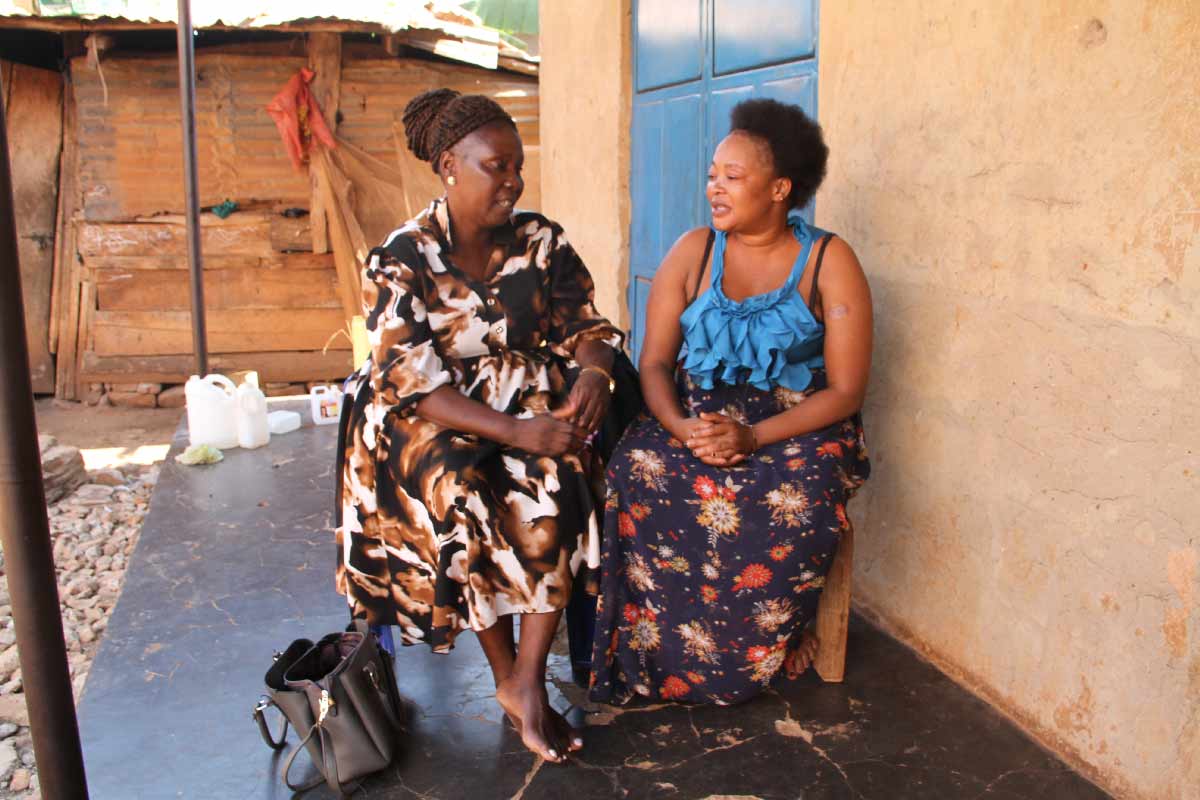
Annet Kizza’s husband is rarely around. The mother of six follows Kirunda’s advice of family planning, safe sex, and regularly getting tested for HIV to be safe. When her children are sick with diarrhoea or malaria, which are common in the region, Kirunda gives them the first doses of drugs and monitors them. If they worsen, she refers them to Makonge. Kizza considers her a confidante, since their relationship extends beyond health provision to counselling.
Confidante, carer, teacher, friend, healthcare champion
“She is hardworking, intelligent, and her being a teacher, people easily cooperate with her,” said Steven Bazannye, an administrator at Kiyindi town, of Kirunda.
Kirunda is attached to 32-bed capacity Makonge Health Centre III, and Rogers Ndayisaba, a nursing officer there, appreciates the community outreach impact of CHWs like her.
Pregnant mothers used to visit herbalists for treatment, he recalls, and rely on traditional birth assistants for care during delivery. That seems to be changing: facility data says that currently 180 to 250 mothers are visiting for antenatal care.
The clinic gets more visitors in general. From 2014 to 2017, Makonge treated fewer than 500 patients each month, he says. Today, they get 1,000 to 1,300 outpatients monthly. And of the about 4,000 children on the facility’s radar, 80% have received at least one vaccine – though he concedes they do encounter unimmunised children from time to time.
Have you read?
No vaccine for poverty
Kiyindi is poor – and Kirunda knows that in many cases, poverty may as well be a health condition. Sixty-five-year-old tailor Gabdiel Katula, a diabetic, disabled father of ten children, including an epileptic daughter, earns 5,000 Ugandan shillings (US$ 1.43) on a good day. It’s barely enough to feed his family, or buy the medicine he and his daughter rely on. So Kirunda assists Katula’s family with food when she can.
Poverty also fuels a heartbreaking criminal trade: child prostitution exposes children not just to psychological and physical trauma, but to STIs and early pregnancy. According to Kirunda, it’s an ongoing problem in Kiyindi, and she has handled such cases with the police. While some culprits are prosecuted, some escape Kiyindi – much to her frustration.
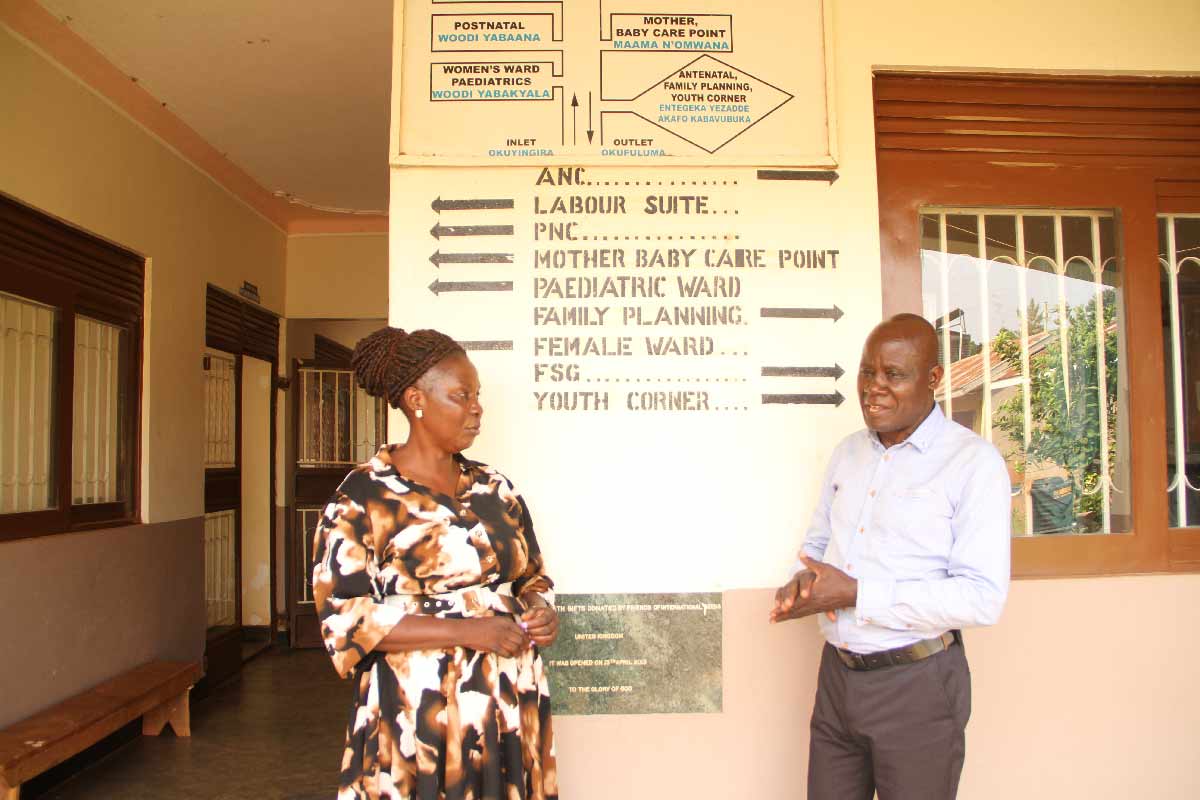
And poverty can break the protective bonds of family. Besides her four own children, Kirunda has adopted five whose parents have died, abandoned them or were unable to care for them. One boy was abandoned by his parents when he was crawling; an HIV-positive girl was found, malnourished, in a dustbin.
Grace Tabuzibwa, a CHW leader in Kiyindi, hails Kirunda for her integrity and courage. “She deals with lots of challenges [related to gender-based violence]. At times she is ordered to go and assess (a situation), and report to the police.
“Money does not motivate her, since she has a volunteer spirit,” Tabuzibwa added.
Growing up, the soft-spoken Kirunda desired to study nursing but her poor parents could not manage to pay for it. Instead, she studied early childhood education out of her passion for nurturing young children. Although she admits being a CHW is challenging, since she works with meagre resources, she has never considered quitting.
“I feel touched when I see somebody suffering. I like helping people come out of problems – I feel God created me to serve him that way. That is my motivation,” she said.
